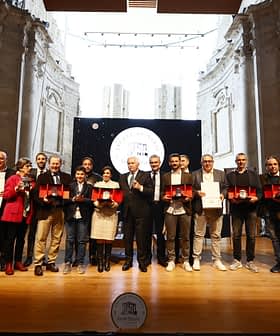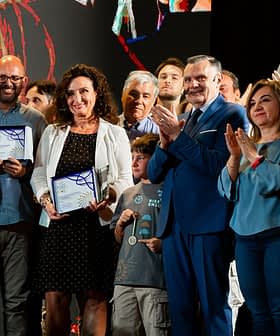Biodynamic Farming: Somewhere Between Science and Faith
Olive groves at the award-winning farm Marina Palusci are managed in accordance with biodynamics, a much-debated but often successful method.
 Young olive trees inundated with an abudant flora at Marina Palusci farm's Oliveto Pependone
Young olive trees inundated with an abudant flora at Marina Palusci farm's Oliveto Pependone“From diamonds, nothing is born. From manure, flowers are born.”
At some point during our meeting, it felt necessary to use the words of a great Italian songwriter and poet to describe how good fruit can grow from a most natural approach.
Biodynamic agriculture goes beyond widespread methods as it bans the use of treatments involving synthetic chemicals and pays close attention to other issues such as the origin of fertilizers.
Such is the attitude of Massimiliano D’Addario, who earned three Gold Awards in a row at the NYIOOC with the monovarietal Dritta L’Uomo di Ferro and a 2018 Gold with the blend Oliomania at this year’s World Olive Oil Competition. In addition to being unfiltered, another distinguishing feature of these products made at Marina Palusci farm in Abruzzo is they were made using biodynamic farming practices.
The number of farms that have implemented this “holistic, ecological and ethical approach to agriculture, gardening, food and nutrition,” as defined by the Biodynamic Association, has increased considerably in recent years. In Italy, biodynamic farms have doubled to about 4,500 over the last decade in response to a growing interest from both national and international consumers.
Farmers may apply for certifications through private associations, of which the best known is Demeter. Nonetheless, the institutional bodies noted the growth of this trend and the Italian Ministry of Agriculture devoted a chapter to biodynamic farming in the last National Strategic Plan for the development of organic farming.
In broad terms, we can say that the biodynamic method is based on a chemical-free agricultural approach with additional requirements. Organic companies like the Gold Award-winning Villa Pontina say they ‘easily’ converted to this agricultural technique, which is based on the spiritual and anthroposophical vision of the world developed by Rudolf Joseph Lorenz Steiner at the beginning of the last century.

The Oliveto Pependone olive grove and manure at Marina Palusci farm
An approach of this kind is what Massimiliano D’Addario performed at his Oliveto Pependone and in the adjacent vineyard where he produces natural wines. At Marina Palusci farm, in the province of Pescara, he manages 40 hectares (about 99 acres) of native varieties such as Dritta and Intosso, flanked by Leccio del Corno, Maurino, Frantoio and Leccino. Seven more hectares (about 7 acres) of Intosso were planted three years ago and will soon enter the production phase.
“As we know, there are different methods of cultivation,” D’Addario said, referring to conventional, integrated and organic farming. “With regard to the environmental impact, biodynamic agriculture goes beyond these widespread methods as it bans the use of treatments involving synthetic chemicals and pays close attention to other issues such as the origin of fertilizers,” the producers said, clarifying that for example, he would never use an organic-certified compost which comes from an urban area because it could contain molecules of disallowed substances such as heavy metals.
“The biodynamic producer basically refers to what our grandparents used to do when chemistry was not used in agriculture,” he observed. “They followed the phases of the moon and the seasons, relying on their power of observation of the plants and of the cosmic elements,” D’Addario explained, specifying that in this vision the concept of soil vitality is fundamental. Uncontaminated plants can grow free and lush.

Massimiliano D’addario
“If a child has always been at home, on his first day of school with the other kids he is very likely to get sick because he is not used to living in that conditions and could develop no antibodies,” he said metaphorically. “While a child who is free to play in the street, even in the rain, probably rarely will get sick in the same context.” Likewise, with this approach plants are naturally strengthened, as they absorb everything they need from the soil.
“Soil fertility and vitality can, and for me must be promoted with absolutely natural means like the compost from horn manure, shredding of pruning residues, and so on,” he pointed out. Moreover, among the various practices, it is crucial to follow the sun and lunar rhythms to carry out some operations. “I waited for the right time to plant the youngest olive trees and get better results,” the producer observed, while we walked among beautiful and vigorous plants of Dritta.
However, we can say that the most distinctive and often controversial biodynamic practices are the compost and spray preparations which are based on vegetable materials including yarrow, chamomile, stinging nettle, oak bark, dandelion and valerian; minerals such as silica and organic matters, namely cow dung.
D’Addario explained that according to the biodynamic vision, humans and animals stand between heaven and earth, and therefore humans can act as a link between these two worlds. The earth is immersed in the planetary spheres of the solar system and the planetary forces affect our planet and the morphology of plants.
The planets also, directly and indirectly, influence the flow of water on earth, while elements such as humus are fundamental for the fertility of soil. Then we can convey the cosmic bond to the earth through the formulation and use of preparations.
The best known of these is probably the Horn Manure, or Preparation 500, which should be made on a particular night of the year. Cow horns are filled with manure (from animals that are not chemically fed and treated). After a period of maturation underground, a few grams of this compost must be dissolved in water and stirred based on the principles of dynamization; then you can spray the preparation on the soil.
As our farmers observed, “despite the effectiveness of this method, only a few of these practices, like the use of certain substances as fertilizers and crop rotation, are supported by research.” For the most part, biodynamic applications have not yet been corroborated by scientific evidence and, for this reason, conventional producers often criticize the approach for lacking objective foundations.
We spoke with Alessandro Piccolo, a professor of agricultural chemistry at the Department of Soil, Plant, Environment and Animal Production at the University of Naples Federico II, who conducted studies on biodynamic practices including an examination of the properties of Preparation 500.

Young olive trees inundated with an abundant flora at Marina Palusci farm’s Oliveto Pependone
“We conducted a study which provided, for the first time, a scientific characterization of this essential product in biodynamic agriculture,” said Piccolo. “Our results show that biodynamic products appear to be enriched with biolabile components and, therefore, potentially conducive for plant growth stimulation.”
He explained that the anaerobic conditions in which the manure is composted, after having been put in the horn and sealed, favor a limited degradation and transformation of lignin compared to aerobic composts, which have an exuberance of bacterial and fungal transformation. In substance, the content of lignin in the Preparation 500 compost is larger than that normally found in aerobic composts.
“This means that the polyphenolic component of Preparation 500 is on average higher than that of a conventional compost,” Piccolo pointed out, specifying that polyphenolic compounds power plant biostimulation. On this basis, by supplying compost from Preparation 500 to plants, greater biostimulation should be achieved, which therefore means a greater effect of the compost on both the microbial microflora of the rhizosphere and the root system, thus a greater stimulation of the plant physiology and biochemistry. “Then, in general, this greater stimulation due to the polyphenols of the Preparation 500, which has been subjected to less aerobiosis, favors both the microbial exuberance of the rhizosphere and the increase in plant growth,” he noted.
“Biodynamics will go forward only if we support objectively scientific research on these products,” the researcher added. That is why his suggestion to biodynamic producers is to seek contact with scientific institutions to better understand the molecular composition of products and their action on plants. “Otherwise, biodynamics will remain a trend and its benefits are likely to be lost, while there is still much to be discovered,” Piccolo concluded.
Our biodynamic producer thinks so too, as over the years he has seen the benefits from this approach on his farm.
Among three-year-old plants of Intosso, he sowed various other types of crops according to the practice of crop rotation. “As you can see, the olive trees are thriving and healthy,” D’Addario observed, showing me young and lush olive trees under whose shade a flourishing meadow of field beans, mustard and oats grows. “I planted legumes, grasses and cruciferous plants because they enriche the soil with different substances which are useful for the olive trees,” he explained. “We put life back at the center.”








